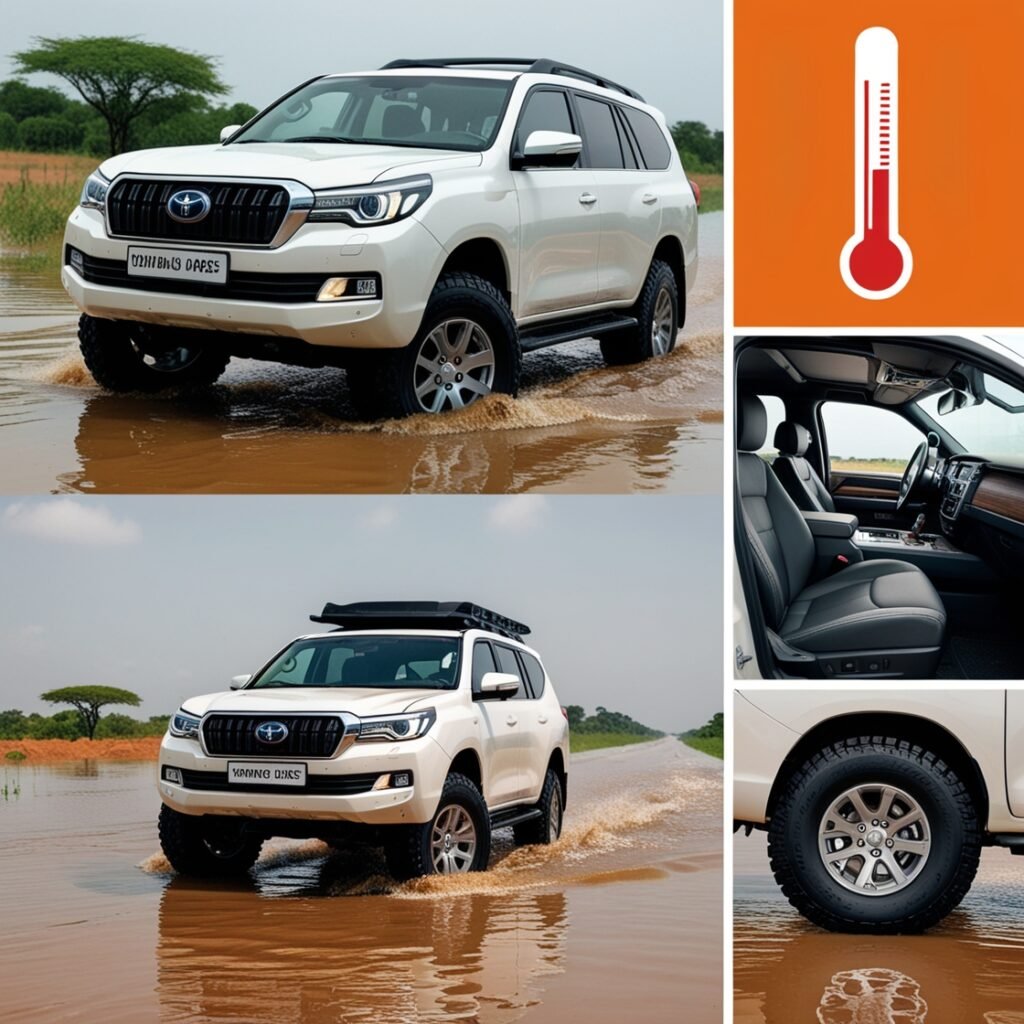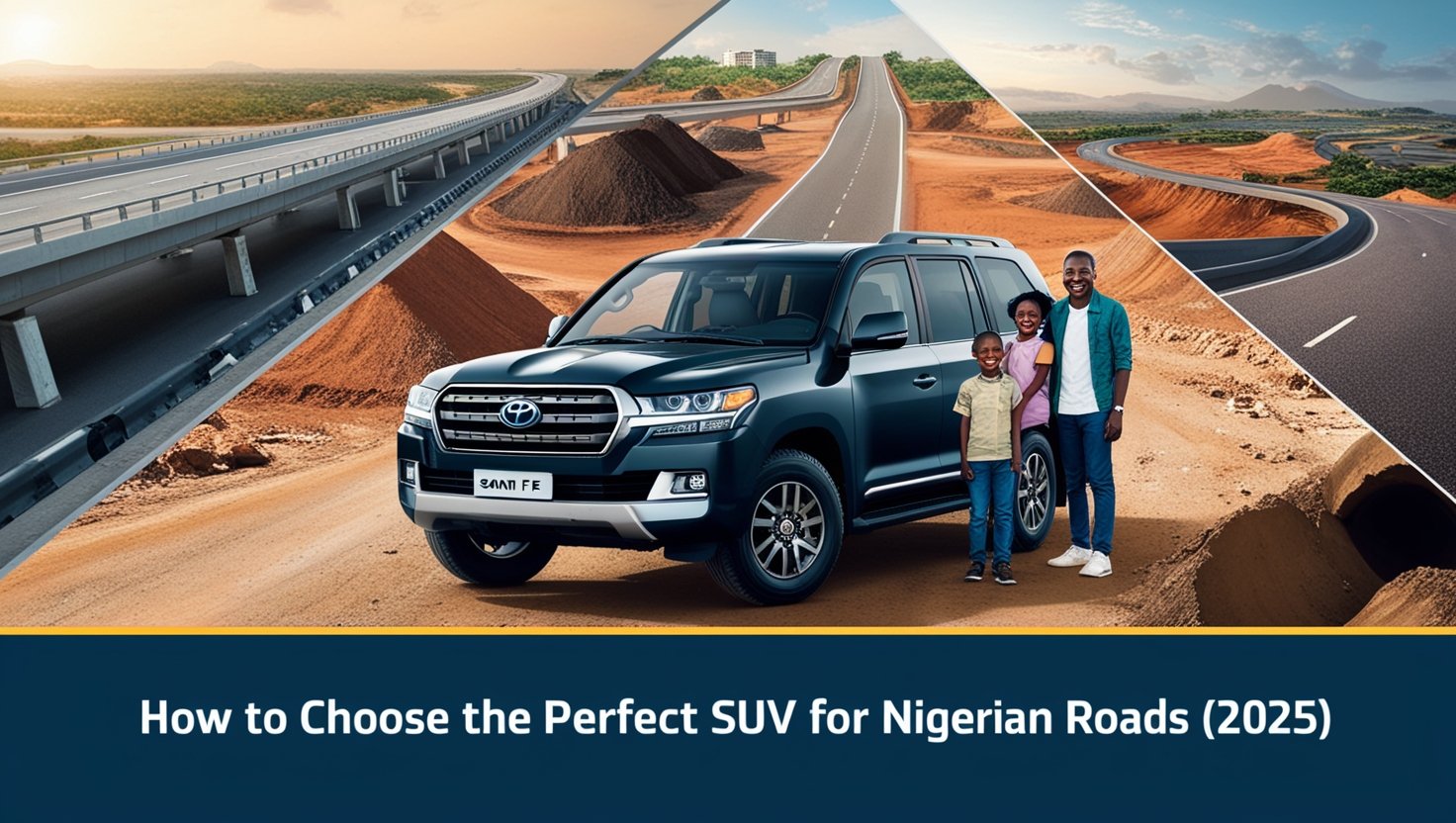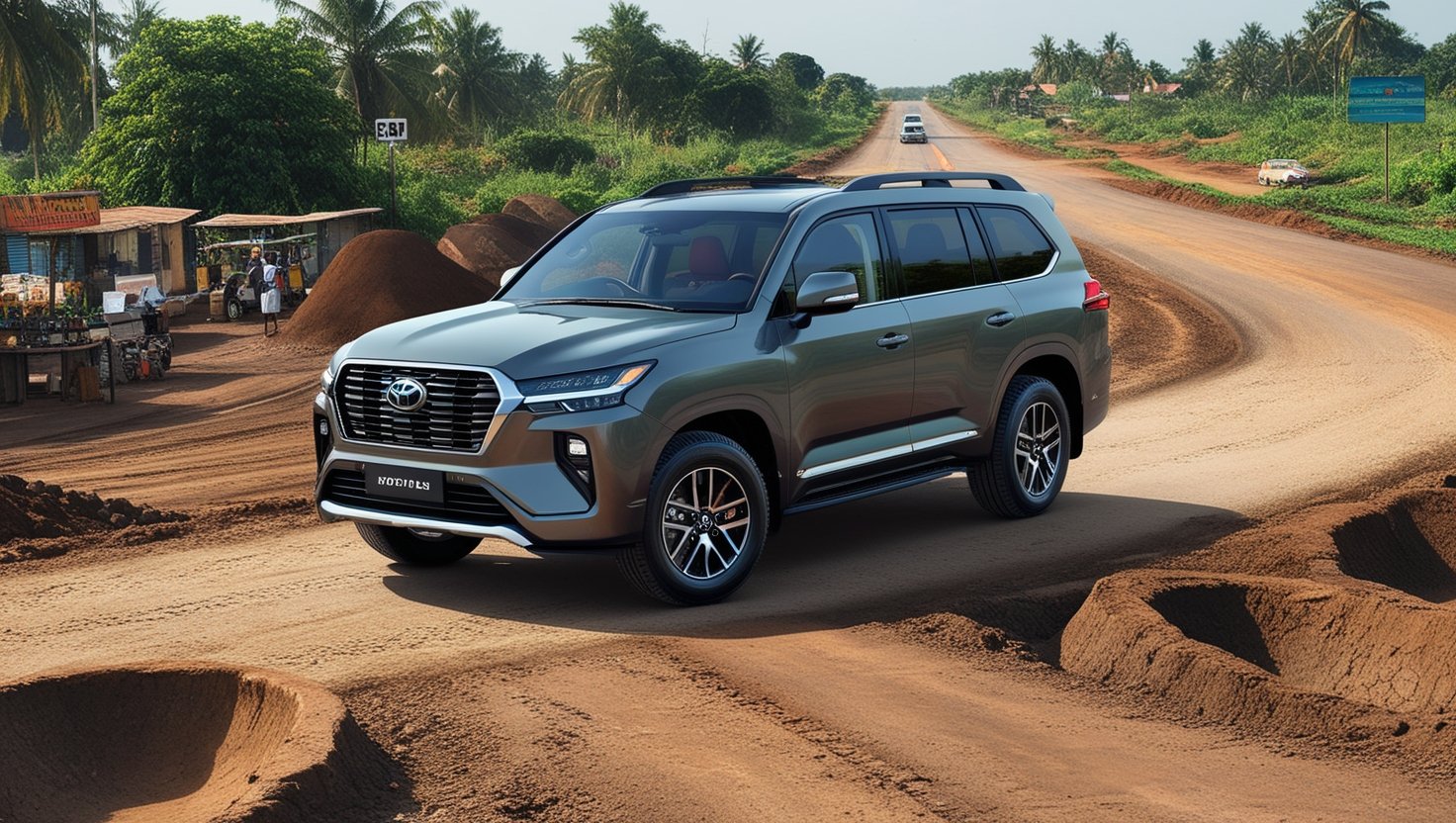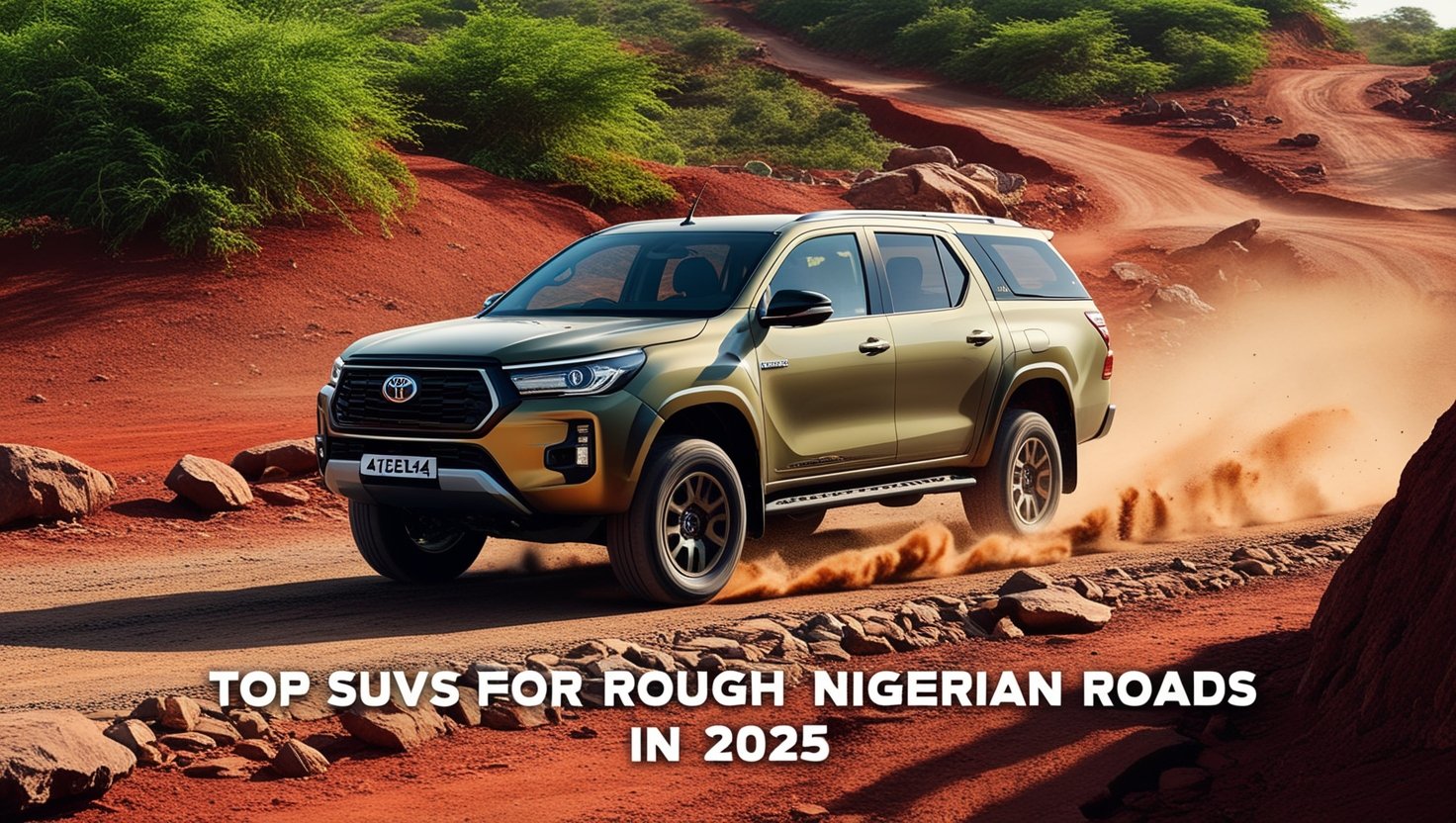SUVs are an increasingly popular choice among Nigerian car buyers due to their versatility, comfort, and durability on diverse road conditions. Whether you’re navigating busy city streets or exploring rural areas, the right SUV offers both reliability and style.
In this guide, we’ll walk you through everything you need to know to find the perfect SUV for your first purchase in Nigeria, from budget considerations to essential features and top models.
For information on buying your first sedan car, check our guide on A Comprehensive Guide to Buying Your First Car in Nigeria (2025)
- Why Choose an SUV as Your First Vehicle in Nigeria?
- Key Factors to Consider When Buying Your First SUV
- SUV Features Ideal for Nigerian Roads and Climate
- New vs. Used SUVs: Which is Better for First-Time Buyers?
- Popular SUV Models for First-Time Buyers in Nigeria
- How to Test Drive an SUV as a First-Time Buyer in Nigeria
- Tips for Negotiating SUV Prices in Nigeria
- Essential Documentation for First-Time SUV Buyers
- Conclusion
Why Choose an SUV as Your First Vehicle in Nigeria?
When I was shopping for my first car in Nigeria, I considered everything from sedans to compact cars. But you know what kept pulling me back? SUVs.
It wasn’t just about how they look (though, let’s be honest, they do have a commanding presence); it was about their practicality.
Here’s why an SUV might just be your best bet as a first-time car owner in Nigeria.
Versatility for City and Off-Road Driving
Let’s face it—Nigerian roads can be unpredictable. One moment, you’re cruising on a smooth highway, and the next, you’re navigating potholes the size of small craters. SUVs are built for this.
Their higher ground clearance and sturdy suspension systems make them ideal for handling the rough terrains in rural areas and the occasional flooded streets during rainy seasons.
I remember a trip to my hometown in Kogi State during the rainy season. While smaller cars struggled to maneuver through muddy roads, my cousin’s SUV cruised through like a boss.
That’s the beauty of SUVs—they are designed to adapt, whether you’re in Lagos traffic or exploring rural routes.
Room for Family and Cargo
If you’re someone who values space, an SUV has you covered. With their roomy interiors, SUVs are perfect for families or anyone who loves taking weekend road trips.
I still think back to a family wedding where my uncle’s SUV fit five adults, luggage, and even a cooler full of drinks. That level of practicality is hard to beat.
For smaller families or singles, SUVs offer a fantastic balance. They’re big enough to transport bulk groceries or even small furniture pieces but not so enormous that parking becomes a headache.
Safety and Comfort Features
Safety is one of the most overlooked factors for first-time car buyers, but it’s critical, especially in Nigeria’s chaotic traffic.
SUVs typically come with advanced safety features like airbags, anti-lock braking systems (ABS), and stability control. And let’s not forget the high seating position—they give you a better view of the road, which is a game-changer in avoiding surprise danfo (bus) moves on Lagos roads.
The comfort factor is another big plus. With their plush seats and roomy interiors, SUVs make long drives less of a chore. Plus, modern SUVs are equipped with features like climate control and infotainment systems, which add a layer of luxury to your daily commutes.
Key Factors to Consider When Buying Your First SUV
Now, before you rush to the dealership, let’s talk about a few important things to consider.
Budget and Financing Options
First things first—know your budget. SUVs, while fantastic, are often pricier than sedans or hatchbacks.
But here’s a tip: Tokunbo (used) SUVs are a great option for first-time buyers in Nigeria. They’re significantly cheaper than new ones but can still offer excellent value if you choose carefully.
You might also want to explore financing options like car loans. Some Nigerian banks and dealerships offer flexible payment plans, which can make owning an SUV more attainable.
Just make sure to factor in the interest rates when calculating your total cost.
Fuel Economy
This is a big one, especially with the rising cost of fuel. SUVs generally consume more fuel than smaller cars, but there are models known for their fuel efficiency.
For instance, compact SUVs like the Toyota RAV4 or Honda CR-V are designed to give you that SUV experience without guzzling fuel.
Maintenance and Spare Parts Availability
Not all SUVs are created equal when it comes to maintenance. Some brands like Toyota and Honda have an abundance of spare parts available in Nigeria, making repairs more affordable. On the flip side, luxury brands might be harder (and more expensive) to maintain.
Here’s a quick tip: Before buying, visit your local mechanic or auto parts shop and ask about the availability of parts for the model you’re eyeing. Trust me, this can save you a lot of headaches down the road.
Resale Value
If you’re like me, you’ll want to think ahead. SUVs with a strong resale value, like the Toyota Highlander or Lexus RX series, can be a smart investment. These models tend to hold their value well in the Nigerian market, making it easier to upgrade when the time comes.
In the end, choosing an SUV as your first vehicle in Nigeria is about balancing your needs with practicality. Whether it’s the versatility to handle all kinds of roads, the space for your growing family, or the peace of mind that comes with safety features, SUVs bring a lot to the table.
Just remember to do your homework—check your budget, research models, and think long-term. Owning an SUV isn’t just a purchase; it’s an investment in comfort, safety, and freedom.
For more insights on car buying, check out my guide on Key Questions to Ask Before Buying a Tokunbo Car in Nigeria. Trust me, you don’t want to miss that!
SUV Features Ideal for Nigerian Roads and Climate
When it comes to driving in Nigeria, the road conditions and climate demand a vehicle built to handle it all. This is where SUVs shine, offering features that make them ideal for both city commutes and adventures into less developed areas.
Let’s dive into the key features that make SUVs perfect for Nigeria.
Ground Clearance
One of the first things you’ll notice about an SUV is its high ground clearance, and honestly, that’s a lifesaver here.
With potholes, uneven terrain, and the infamous rainy-season floods, you need a car that won’t scrape its underside at every bump. I’ve had friends whose sedans ended up with damaged oil pans just from regular Lagos roads—don’t let that be you.
For Nigeria, a minimum ground clearance of 200mm is ideal, as it allows you to navigate bad roads without worrying about damage. Popular models like the Toyota Highlander and Honda CR-V excel in this area.
Four-Wheel Drive (4WD) or All-Wheel Drive (AWD)
If you’ve ever had to drive through muddy village paths or hilly terrain, you’ll appreciate the benefits of 4WD or AWD. These systems distribute power to all four wheels, giving you better traction and control in tricky conditions.
4WD is particularly useful for off-road adventures, like visiting farms or construction sites, while AWD works well for everyday driving with the occasional bad patch. Some great 4WD options include the Toyota Prado, while compact SUVs like the Subaru Forester offer reliable AWD systems.
Durable Suspension and Tires
Nigeria’s roads are a true test of any car’s suspension system. An SUV with a robust suspension can absorb the shocks from potholes and rough roads, making your ride smoother and reducing wear and tear. Look for models with independent suspension systems or reinforced shocks.

Also, don’t skimp on quality tires. All-terrain tires are a smart choice because they handle both city roads and rougher conditions effectively. Brands like Michelin and Bridgestone are worth considering.
Air Conditioning and Climate Control
With temperatures regularly hitting 30–40°C in many parts of Nigeria, a good air conditioning system isn’t just a luxury—it’s a necessity. Modern SUVs often come with dual-zone or even tri-zone climate control, so everyone in the car can stay comfortable.
One tip: when shopping for an SUV, test the air conditioning system before buying. I once made the mistake of assuming it worked, only to discover during a hot Lagos traffic jam that it barely cooled the car.
For more insights on car buying, check out my guide on Must-Have SUV Features for Driving in Nigeria (2025). Trust me, you don’t want to miss that!
New vs. Used SUVs: Which is Better for First-Time Buyers?
The choice between a new or used SUV is a common dilemma, especially for first-time buyers in Nigeria. Both options have their pros and cons, so let’s break it down.
Pros and Cons of New SUVs
There’s nothing like the smell of a brand-new car, right? Buying a new SUV means you’re getting the latest technology, a fresh warranty, and the peace of mind that comes with knowing your car hasn’t been through someone else’s wear and tear.
However, new SUVs come at a premium. In Nigeria, where the exchange rate affects car prices, the cost of a brand-new Toyota RAV4, for instance, could be several times that of a used one.
Additionally, new cars depreciate quickly—sometimes losing up to 20% of their value in the first year.
Advantages of Buying a Used SUV
For first-time buyers, used SUVs offer tremendous value. They’re significantly cheaper than new models, and you can often find higher-end brands at a fraction of their original cost. Plus, used SUVs typically have lower insurance premiums, which is another way to save.
That said, the key is to choose wisely. Some used SUVs may have hidden issues, so always do your homework.
What to Look for in a Used SUV
Before buying a used SUV, check the vehicle history report to uncover any previous accidents or major repairs. Sites like CARFAX (for imported vehicles) or local VIN-checking services can be helpful.
Inspect the mileage—generally, anything under 100,000 km is reasonable. Also, have a trusted mechanic examine the engine, suspension, and air conditioning system. A proper test drive can reveal issues like unusual noises or poor alignment.
Both new and used SUVs have their merits, but the decision ultimately depends on your budget and priorities.
Whichever you choose, take your time to research and inspect thoroughly. And hey, if you’re still unsure, check out my detailed guide on Things to Watch Out for When Buying a Tokunbo Car in Nigeria—it might just save you from making a costly mistake.
Popular SUV Models for First-Time Buyers in Nigeria
SUVs have become increasingly popular in Nigeria, thanks to their versatility and ability to handle the country’s unique driving conditions.
If you’re a first-time buyer, you might be wondering which models strike the right balance between reliability, cost, and practicality.
Below are four great options to consider.
Toyota RAV4
The Toyota RAV4 is a household name in Nigeria, and for good reason. Known for its durability and low maintenance costs, the RAV4 can handle both city traffic and slightly rougher terrains with ease.
Its ground clearance is perfect for those dreaded potholes, and the fuel economy is a huge bonus given the rising cost of petrol.
A standout feature is the spacious interior, making it family-friendly. Plus, Toyota’s extensive network in Nigeria means you’ll easily find spare parts and mechanics trained to fix it.
Whether you’re commuting in Lagos traffic or heading to the countryside, the RAV4 remains a solid choice for first-time buyers.
Honda CR-V
The Honda CR-V is often praised for its exceptional reliability. Once you get one, you’re less likely to experience frequent breakdowns—a blessing in a country where finding trusted mechanics can be tricky.
The CR-V also boasts a smooth ride, spacious cabin, and user-friendly technology, which makes it ideal for families or professionals who prioritize comfort.
Another plus? Its resale value. If you decide to upgrade in the future, you’ll find that CR-Vs hold their value quite well. And while Honda parts may not be as ubiquitous as Toyota’s, they’re still relatively easy to source in urban areas like Lagos or Abuja.
Hyundai Tucson
For those on a tighter budget, the Hyundai Tucson delivers great value. It’s not just about affordability—the Tucson offers impressive fuel efficiency, which is a lifesaver for frequent drivers.
Despite being less flashy than some of its competitors, the Tucson packs essential features like a comfortable ride, decent ground clearance, and a spacious boot for luggage or groceries.
One thing worth mentioning is Hyundai’s growing presence in Nigeria. With proper maintenance, the Tucson can serve you well for years without breaking the bank.
Kia Sportage
If style and safety are high on your priority list, the Kia Sportage is worth a look. Its modern design turns heads, while features like lane-keeping assistance, blind-spot monitoring, and advanced airbags provide peace of mind on the road.
The Sportage also offers a well-finished interior and a comfortable driving experience. While it’s not as fuel-efficient as the Tucson, it compensates with its durability and innovative technology.
Kia’s service network in Nigeria is growing, making spare parts increasingly accessible.

How to Test Drive an SUV as a First-Time Buyer in Nigeria
Test driving an SUV might seem straightforward, but trust me, there’s more to it than just hopping in and driving around the block. A proper test drive can save you from future headaches and help you choose a vehicle that suits your lifestyle.
Checklist of Features to Evaluate
Start with the basics. Pay close attention to how the brakes respond—do they feel firm and steady, or spongy? Then check the steering: it should feel responsive, not too loose or stiff. Test the suspension by driving over uneven roads; the SUV should absorb shocks comfortably without excessive noise or vibrations.
Don’t forget the engine. Whether it’s a petrol or diesel engine, acceleration should feel smooth and powerful. Weird noises like knocking or screeching could indicate trouble under the hood.
Testing on Different Terrains
Nigerian roads are unpredictable, so it’s crucial to test your SUV on both smooth city streets and rougher terrain. Find a road with potholes or a gravel path, and see how the car handles. If the suspension struggles or you feel every bump, it might not be the right SUV for Nigerian conditions.
For off-road enthusiasts, testing the 4WD or AWD capabilities is a must. Try steep inclines or sandy paths if possible—this is where SUVs like the Toyota Prado or Subaru Forester shine.
Comfort and Visibility
Finally, consider the driving comfort. Is the seat adjustable enough for you to find a good position? Can you see clearly over the hood? SUVs typically offer higher seating positions, which improve visibility—a key safety feature for navigating Nigerian roads.
Spend a few minutes testing the air conditioning too. With Nigeria’s heat, you’ll regret buying a car with a subpar cooling system.
Pro Tip: Take your time during the test drive and don’t let the seller rush you. Bring along a trusted mechanic or experienced friend if you’re unsure about what to look for. This is a big investment, so make it count!
For more detailed advice, check out our guide on How to Choose the Perfect SUV for Nigerian Roads (2025).
Tips for Negotiating SUV Prices in Nigeria
Buying an SUV in Nigeria can be a serious investment, especially with how fluctuating the market can be. But trust me, negotiating the price isn’t as daunting as it seems—once you’re armed with the right tools and a bit of confidence, you can walk away with a much better deal.
Let’s break it down step-by-step:
Researching Prices and Current Market Trends
Before you even think about stepping onto a car lot or meeting a seller, do your homework. Start by researching the average prices of the SUV models you’re interested in—Toyota RAV4, Honda CR-V, Hyundai Tucson, or even a Kia Sportage. Websites like Jiji.ng, Cheki.com.ng, and local dealership platforms can give you a good sense of what these vehicles are going for in your area.
But here’s the trick: don’t just look at the sticker price. Factor in things like mileage, condition, and whether the car is new or used. Sellers often inflate prices, so knowing the actual market value gives you leverage during negotiations.
Also, keep an eye on economic factors like fuel price changes or import duties—they can heavily influence SUV prices in Nigeria.
Knowing When to Buy
Timing is everything when it comes to getting a good deal. From my experience, buying an SUV at the end of the month or quarter can be a smart move. Dealerships and even private sellers are often more flexible as they try to meet sales targets or clear inventory.
Holiday seasons or end-of-year clearance sales are also great opportunities. For instance, many dealers run promotions during festive periods like Christmas or even after big auto shows. That’s when discounts or bonuses are up for grabs.
Effective Negotiation Techniques
Alright, let’s get to the actual haggling. The golden rule: never accept the first price. Start lower than your target price but not so low that the seller feels insulted. A simple, “This price feels a bit steep—can we work something out?” can open the door for discussions.
If you’re buying used, emphasize any flaws you notice—maybe the tires are worn, or the suspension isn’t perfect. Politely use those issues to request a lower price. Sellers expect this, so don’t shy away.
Another tip? Be prepared to walk away. Once a seller sees you’re not desperate, they’re more likely to drop the price to keep the deal alive.
Essential Documentation for First-Time SUV Buyers
When the negotiation is done, and you’re ready to seal the deal, having the correct paperwork is crucial. Incomplete or missing documents can cause major headaches down the line.
Here’s what you need:
Vehicle Registration and Licensing
In Nigeria, registering your vehicle isn’t just about legality—it also ensures you’re driving without fear of getting flagged at checkpoints. Start by visiting your local Federal Road Safety Commission (FRSC) office or a state vehicle registration office. The process usually includes:
- Filling out a registration form (you’ll need ID and proof of ownership).
- Paying the appropriate registration fee.
- Receiving your vehicle license plate and registration certificate.
Pro tip: Double-check that the engine and chassis numbers match the details on the registration documents. Any mismatch could land you in trouble with law enforcement.
Insurance Options
Car insurance in Nigeria is mandatory, but the type you choose depends on your budget and needs. The most common is Third-Party Insurance, which covers damages to other vehicles or people in an accident.
However, for an SUV—especially a new one—it’s worth considering Comprehensive Insurance. This type of coverage includes theft, fire, and even accidental damage to your own car.
Providers like AIICO, Leadway Assurance, and AXA Mansard offer tailored plans, so shop around to find the best fit.
Ensuring Clear Vehicle History
If you are buying a used SUV, this step is non-negotiable. Ask for the vehicle’s history report, including previous ownership, accident records, and maintenance history.
Tools like the National Vehicle Identification System (NVIS) can help you verify that the car isn’t stolen or involved in legal disputes.
Don’t rely solely on the seller’s word—inspect the car thoroughly or bring a trusted mechanic along to assess its condition. Check for signs of tampering, like mismatched paint or inconsistent mileage.
Final Tip: Keep copies of all documents (both digital and physical) in a safe place. In Nigeria, these papers are your lifeline if there’s ever a dispute or an issue with law enforcement.
For more insights, check out our guide on SUV Maintenance Tips for Nigerian Roads. It’s packed with advice to keep your vehicle running smoothly for years to come!
Conclusion
Finding the perfect SUV as a first-time buyer in Nigeria may seem daunting, but by considering your needs, budget, and preferences, you can make a confident choice.
Take your time to evaluate your options, prioritize key features, and don’t hesitate to negotiate for the best deal.
Ready to hit the road in your new SUV? Use these tips as well as our guide on How to Choose the Perfect SUV for Nigerian Roads (2025) and Must-Have SUV Features for Driving in Nigeria (2025) to drive away in the vehicle that’s right for you!




